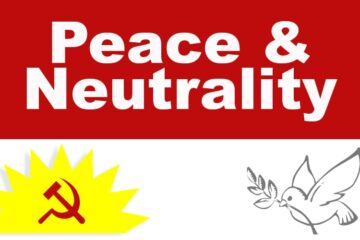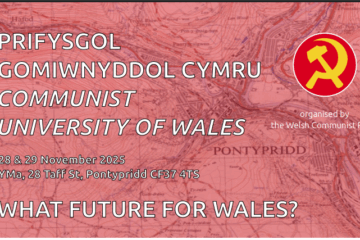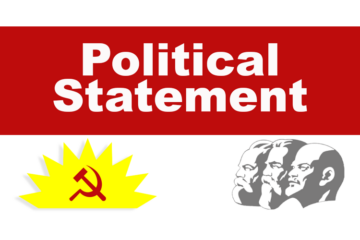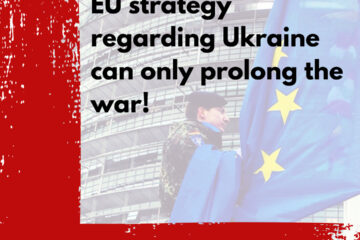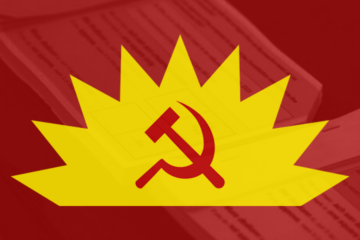In what was a extremely interesting Political speech today in Connolly House, Dublin at the Annual James Connolly Memorial Lecture. Comrade Silak threaded the links from Marx, James Fintan Lawlor, Lenin and our own James Connolly.
A chairde,
Bhí teasghrá do mhuintir na hÉireann i gcónaí aige, agus fuath aige don bhaothpholaitíocht.
It is with these kind words Thomas O’Neill described James Fintan Lalor early in his
biography: he always had fervent love for the people of Ireland and a hatred of foolish
politics. As romantic as the line reads, in today’s terms we would agree that Lalor was
steered by solid analysis, and not pathos.
Born in Tinnakill, County Laois in 1810, Lalor was a distinctive voice, “keenest intellect in
Ireland in his day”, as Connolly described him in the Labour in Irish History. O’Neill as
Lalor’s biographer was dismayed by Connolly’s treatment of Lalor, making “a little Karl
Marx of him”. Every good reader of Connolly will know this is blatantly untrue—the little
Karl Marx of Ireland was William Thompson, of Clonkeen, Roscarberry, County Cork.
Jokes aside, for most of us familiar with Lalor today, Connolly’s account in the Labour in
Irish History was the entry point to Lalor’s work. It is only appropriate to now quote
Connolly, quoting Lalor.
“[I]n his writings, as we study them to-day, we find principles of action and of society which have
within them not only the best plan of campaign suited for the needs of a country seeking its freedom
through insurrection against a dominant nation, but also held the seeds of the more perfect social
peace of the future. All his writings at this period are so illuminating that we find it difficult to select
from the mass any particular passages which more deserve reproduction than others. But as an
indication of the line of argument pursued by this peerless thinker, and as a welcome contrast to the
paralysing respect, nay, reverence, for landlordism evidenced by Smith O’Brien and his worshippers,
perhaps the following passages will serve. In an article entitled The Faith of a Felon, published July
8, 1848, he tells how he had striven to convert the Irish Confederation to his views and failed, and
says:
“They wanted an alliance with the landowners. They chose to consider them as Irishmen, and
imagined they could induce them to hoist the green flag. They wished to preserve an aristocracy. They
desired, not a democratic, but merely a national, revolution. Had the Confederation, in the May or
June of ’47, thrown heart and mind and means into the movement, I pointed out they would have
made it successful, and settled at once and forever all questions between us and England. The
opinions I then stated and which I yet stand firm to, are these:
- That in order to save their own lives, the occupying tenants of the soil of Ireland ought, next
autumn, to refuse all rent and arrears of rent then due, beyond and except the value of the overplus of
harvest-produce remaining in their hands, after having deducted and reserved a due and full
provision for their own subsistence during the next ensuing twelve months. - That they ought to refuse and resist being made beggars, landless and homeless, under the
English law of ejection. - That they ought further, on principle, to refuse all rent to the present usurping proprietors, until
the people, the true proprietors (or lords paramount, in legal parlance) have, in national congress or
convention, decided what rents they are to pay, and to whom they are to pay them. - And that the people, on grounds of policy and economy, ought to decide (as a general rule
admitting of reservations) that these rents shall be paid to themselves, the people, for public purposes,
and for behoof and benefit of them, the entire general people.
It has been said to me that such a war, on the principles I propose, would be looked on with
detestation by Europe. I assert the contrary; I say such a war would propagate itself throughout
Europe. Mark the words of this prophecy – the principle I propound goes to the foundations of
Europe, and sooner or later will cause Europe to outrise. Mankind will yet be masters of the earth.
The right of the people to make the laws – this produced the first great modern earthquake, whose
latent shocks, even now, are heaving in the heart of the world. The right of the people to own the land
– this will produce the next. Train your hands, and your sons’ hands, gentlemen of the earth, for you
and they will yet have to use them.”
Lalor emerges from, to cite the man himself, “the mists of a famine”, but very conscious of
the particular and universal conditions alike. O’Neill writes that “it was obvious that it was
not his intention to construct a philosophical system. The opposite is what he had in mind. In
fact his aim was the relief of economic deprivation.” It does sound like that Lalor, absolutely
not “a little Karl Marx” held the belief that the philosophers had only interpreted the world, in
various ways while the point, however, was to change it.
In another anecdotal Marx-styled move, Lalor introduced the metaphor of the land question
being the steam engine to pull the train of nationalism after it. Of course, we are reminded of
Marx’s revolutions as locomotives of history. When Lalor speaks of land, and indeed
everything in the country, he is clear. Grab any copy of the Irish Worker in the archives, you
will find Lalor’s words on the masthead: “The principle I state, and mean to stand upon is
this, that the entire ownership of Ireland, moral and material, up to the sun and down to the
centre, is vested of right in the people of Ireland”. There is our starry plough: from the land to
the stars. We don’t ask for the stars to exploit them; but to see them clearly.
We have so far, through fragments of Lalor’s political thought leading up to the revolutionary
1848, assembled the main components of today’s topic: land, sovereignty, and the ideas that
connect them, ideas green, red, and train-like.
The tiresome, and so often anti-dialectic, discussion of precedence of the green and red
occupies a lot of space. Locally, the green in question would be that of nationalism, or of
republicanism; internationally, the green-red conversation dons the green of
environmentalism. In today’s analysis, we will be looking at both greens.
The Irish green-red discussion has two major focal points: unsurprisingly so, as those two
points are the biggest historical attractors of the 20 th century history in Ireland: that of James
Connolly and of the republican struggle in the North of Ireland. Seán O’Casey would often be
used as the typical representative of the voices that would challenge Connolly for swapping
the red flag with the green on the march from the Lockout to the Rising. And then, we have,
for example, historian John Whyte who taking a look at the North of Ireland in 1978 writes
that “[Nationalist] sentiment has great force for those who have been socialised to accept it.
But it has nothing to do with Marxism… Those who adopt the traditional Marxist analysis in
Ireland are Green before they are Red.”
To paraphrase Che, it’s not my fault if reality is Green.
The Irish context of colonisation, recognised by Marx, Engels, and Lenin casts a long shadow
over the material conditions, and consequently the nature of social relations. From the rising,
the Tan war, and the partition, to the foreign direct investments, Shannon Airport and
Aldergrove, and collapse of housing, health, and planning, there is a long and crooked line to
be drawn. These conditions cannot be readily replaced by those of European countries, but
also not by those of the colonies in the rest of the world: the Irish characteristics dominate the
context.
For the other green, we turn back to Lalor’s locomotive: the land question. Here I accept the
danger of conflating the environment with the land, and I do it consciously, for a number of
historical and contemporary reasons. Let us begin with the contemporary alienation from the
land: in the common urban discourse, the perception of land, agricultural or otherwise, has
been removed from the human experience. Virtualised and ethereal, entangled with the
perception of the farmer as a tractor parked in the city centre during a protest over a policy
portrayed in media as a clear-cut deal… land is simply alien. If we, for a moment, take the
land to be a representative of the environment we live and work in, what sense is there to
sever the fundamental, metabolic connection between us and the land? The sense, of course,
is that of alienation from labour, from resources, and opening space for commodification and
superexploitation. When Lalor speaks of land, it is about securing everyone’s existence and
ending exploitation, by means of self-sufficiency. Property is recognised as means of colonial
exploitation, and Lalor by no means goes on to abolish it, but wants to make sure it serves a
liberating, emancipating cause after the revolution, putting security of subsistence first.
Remember, this is 1848, Ireland. Insecurity of subsistence is at its extreme, in form of mass
murder. The mass in question is far from the, to quote Lalor, “the eight thousand individuals
who are owners of Ireland by divine right and the grant of God, confirmed (by themselves) in
sundry successive acts of parliament.”
Today, the environmental green is a good shade to paint over the contradictions of the
capitalist system. One wide brush for that task is the pronoun “we”: take, for example, the
idea of the climate crisis as the great equiliser, all of us being on the same proverbial boat. If
we needed a more blatant, almost cartoonish demonstration of this fallacy, the COVID
pandemic took us through all the stages of the “same boat” theatre.
It should not be controversial to say it: there are no natural disasters. That does not imply
some sort of particularly malevolent agency. To quote the United Nations Office for Disaster
Risk Reduction, “A natural hazard, such as a hurricane, earthquake, or flood, only becomes a
disaster when it impacts a community that is not adequately protected, and whose population
is vulnerable as a result of poverty, exclusion or socially-disadvantage.”
In that perspective, it is hard to imagine the boat to be the same. The pronoun “we” can
hardly permeate the class division when we speak of effects of climate change, but equally
so, it has no use in describing the effects on the environment. The forces of production have
the capacity of exploitation of both the worker and the environment at the literal industrial
scale—hardly the same boat. Look at Lalor in the famine times, not just recognising the
specific nature of the coloniser-caused disaster, but resisting the obscuring of causes in the
public sphere. Take, for instance, when the Bishop of New York, John Hughes, said the
following:
“I may be told that this famine is a visitation of Divine Providence, but I do not admit that. I fear
there is blasphemy in charging on the Almighty the result of our own doings…. God’s famine is
known by the general scarcity of food of which it is the consequence. There is no general scarcity,
there has been no general scarcity in Ireland, either during the present or the past year, except in one
solitary species of vegetable. The soil has produced its usual tribute for the support of those by whom
it was cultivated… The vice inherent in our system of social and political economy is so settled that it
eludes inquiry. You cannot trace it to the source. The poor man on whom the coroner holds an inquest
has been murdered, but no one killed him. Who did it? No one did it. Yet it was done.”
There, Lalor asks “But is it, indeed, so obscure? Has it then been able to conceal or disguise
itself? It must be dragged out.” Then he proceeds to drag out the class interest.
“The landowners grew bustling, if not busy, in the work of demanding relief and dispensing it. To the
local relief funds very many of them, indeed, contributed nothing; but there was others who
contributed even so large a sum as 000.000¼ percent on their annual income, and were most properly
appreciated and praised as beneficent individuals, while several gave a percentage of double or
thrice that amount—and Ireland rung with applause.
They demanded the Labour Rates Act; called for works which would increase the productive powers
of the soil; and grew clamorous in the expression of pity for their suffering countrymen, whom they
charged Government with delivering up to famine by adopting an erroneous and insufficient system of
relief. Finally, under the flag of their country they met in the Rotunda, and formed an Irish party for
the professed object of establishing and supporting an Irish party for Irish purposes; that is to say, for
the purpose of taking care that the pecuniary interests of the landowners of Ireland should suffer no
detriment, more especially by any extension of poor law relief. Such is the history of the present
famine. Does it furnish or suggest an answer to the concluding query of Dr. Hughes?”
It is with this clarity that we must approach the crises of our time and dispel the mystery
around their causes. In our analysis, we cannot be blinded by the simplicity of the immediate
cause, be it a potato-killing microorganism, oxygen-sucking water algae, or a deadly
immunity-stripping virus. We cannot be blinded by complexity of the networks of capital that
cause, exploit, and manage crises as their opportunities. We must be capable of identifying
the ways this happens, recognising where their choke points are, and mobilising against them.
For a moment, I want to look at the socialist visions of our time focusing on the environment.
One that asserts dominance through its effectiveness is the Chinese doctrine of the ecological
civilisation. It is often encapsulated within its motto: “We want green waters and green
mountains, but we also want gold mountains and silver mountains. It is better to have green
waters and green mountains than gold mountains and silver mountains—and green waters
and the green mountains are gold mountains and silver mountains.” This hits close to home
with the literal gold mountains and green mountains in the Sperrins, and of course, the
catastrophe of Lough Neagh.
It is simple enough when Xi Jinping states it: in the dialectics of development and protection
of the environment, the environment must come first. The mechanics of practice are,
however, complex. Chen Yiwen, in this month’s Monthly Review, writes:
“First, it is necessary to reconcile the relationship between utilizing and restraining capital.
Compared to most countries and regions in the world, contemporary China, having established a
basic socialist system, has more favorable social conditions for promoting ecological civilization.
One important aspect of this is the continuous “greening” of the political ideology and governance
strategies of the CPC. For example, the Twentieth National Congress emphasized that Chinese
modernization is socialist modernization and that “respecting, adapting to, and protecting nature is
essential for building China into a modern socialist country in all respects.” However, due to the
social conditions of the primary stage of socialism and the influence of the capitalist-dominated world
system, China’s eco-civilizational progress cannot simply reject economic policy tools based on
market mechanisms and capital functions. These internationally mainstream green development
measures, while seemingly universally effective if developed and widely applied, may impact and
erode socialist institutions and cultural concepts. For this reason, since 2020, the CPC and the
government have repeatedly emphasized that we must understand the nature of capital and how it
works, setting up “traffic lights” for capital to make sure that no capital of any type can be allowed to
run out of control. Therefore, China’s progress toward ecological civilization must not only break
free from traditional underdeveloped socialism but also guard against the “green capitalism” trap.
This means fully utilizing market mechanisms, fiscal and financial policies, and capital management
methods to optimize the allocation of natural resources and build a green modern economic system. It
also requires accelerating the improvement of the socialist institutional system, exploring effective
forms of public ownership, and continually enhancing the ability to engage with capital and control it,
thereby advancing the historical trend of “transcending capital through itself.”
I am, for a particular reason, reminded of Lenin and the question of attracting foreign capital
into the USSR under the New Economic Policy. Both the NEP and the ecological civilisation
navigating the international capital landscape acknowledge the material conditions and try to
develop socialism within the contradictions of hegemonic capitalism. And yet, neither of
those two examples means that we can go home and sleep well remembering that Ireland is
merrily running a foreign direct investment-based economy, and turning environmental
policy into a game of capital. What is the fundamental difference?
Fintan Lalor wrote “In order to negotiate, the parties must stand on equal terms, and each be
independent of the other.” O’Neill quotes this line as the ideological predecessor of De
Valera’s line in 1921 that “if peace is to come, the negotiations must be conducted between
nation and nation.” Otherwise we have Kanafani’s negotiation of the neck with the sword.
While it is open to a depressing debate how much of the negotiations, from the Anglo-Irish
Treaty, over the Belfast Agreement, to that of Nice and Lisbon, happened on such terms,
sovereignty is the cornerstone of any meaningful action. We cannot have our new economic
plan or be part of the ecological civilisation without it. There is a lot to be gained from
debates on means of controlling capital after the revolution, but none of that replaces the
revolution itself. There is probably something to be gained from debates on the critique of
power, but none of that replaces the revolution itself. Revolution in name, too, does not
replace that in essence: in vein of Connolly’s oft-cited green flag on Dublin castle, Lalor
writes “The land question contains, and the legislative question does not contain, the
materials from which victory is to be manufactured.” The Free State was no victory for the
working class, no matter how heavily legislated. The bourgeois structures consolidated and
replaced the previous power in a move by no means unique to Ireland. When one reads
Mahdi Amel, his analysis of the colonial mode of production, so much of it rhymes with the
post-treaty Ireland—including but not limited to the issue of class consciousness, bourgeois
betrayal and comprador relations.
I want to bring you back to the mountains of gold now: the story of the phrase origin dates it
back to 2005 and Yu village. Once the richest village in Anji county with its mining and
cement production amounting to 95% of income, in the early 2000s the village made the
decision to close the mines and save the declining ecosystem. Xi visited the village in 2005
and spoke of the mountains of green and the mountains of gold, praising the initiative. I am
not offering an idyllic story of happily ever after; but I am looking at Sperrins, at Shell to Sea,
at Shannon LNG and imagining democracy at work, the power to refuse and the vision to
accept the refusal as the correct ideological choice. In a country where capital organises into
the hegemonic political force, this is impossible. You don’t get acceptance and praise, you
get a threat in the back of the Garda car.
You don’t need Amel to tell you about the tail of colonialism, which as much as a tail of a cat
is… well, a cat, remains colonialism and should not be taken as a different, weaker, or less
vicious beast. The removal of the colonial army is the initial success, and we haven’t had that
success either. The exploitation that comes afterwards, in which foreign capital overpowers
and overwhelms, determines class relations and conscripts the colony into the current state of
imperial order, is a fundamental historical dynamic. As we celebrate 70 years since the
Bandung conference, we celebrate the collective effort to subvert this dynamic by the non-
aligned states.
Non-alignment was a project of national liberation, push against colonialism and dependence.
It is an anti-imperialist movement, not founded on a moralist premise, or pure dislike of war,
exploitation, and apartheid.
Sean Lemass dispels any confusion on why Ireland is not a part of the non-aligned
movement. “I think it would be highly undesirable that remarks made here should give the
impression in Europe that there is a public opinion in this country which regards membership
of NATO as something discreditable. The view of the Government in that regard has been
made clear. We think the existence of NATO is necessary for the preservation of peace and
for the defence of the countries of Western Europe, including this country. Although we are
not members of NATO, we are in full agreement with its aims.” This is Lemass at his
Economic Expansion peak: his bid to join the European Economic Community just failed, but
the efforts to become the best client state in the world continue as he takes more control over
international affairs from Frank Aiken. The Europe Lemass cares about is in the lineage of
the same Europe Lalor was speaking of, the imperialist project perfecting the dynamics of
capital. The same lineage gives us the militarising Fortress Europe of today, which leaves us
with the moral, material, and immediate obligation to resist it.
For good measure, at the very end of this talk I want to superficially disagree with one
position of Lalor’s. “Any man who tells you that an act of armed resistance – even if offered
by ten men only – even if offered by men armed only with stones – any man who tells you
that such an act of resistance is premature, imprudent or dangerous – any and every such man
should at once be spurned and spat at. For, remark you this and recollect it, that somewhere,
and somehow, and by somebody, a beginning must be made and that the first act of resistance
is always, and must be ever, premature, imprudent and dangerous. Lexington was premature,
Bunker’s Hill was imprudent, and even Trenton was dangerous.” Here Lalor passionately
runs into the fallacy of the absolute, while trying to make a solid point.
Neither an anarchist or an idealist, Lalor knows better than to suggest action for the sake of it.
He wants make the point of missing 100% of shots you don’t take; but is that a salient point
when you have major threat of an own goal with every shot?
I am admittedly not the first to superimpose this Lalor’s quote with that of Lenin on the
Easter Rising, Albert Glotzer got there first.
“The misfortune of the Irish lay in the fact that their rising was untimely, since the rising of the
European proletariat was not yet ripe. Capitalism is not so harmoniously constructed that separate
sources of risings can suddenly unite without failure of overthrow. On the contrary, the difference in
time, the difference and dissimilarity in the place of the risings act as a guarantee for the greatness
and depth of the joint movement; it is only by untimely, partially and consequently unsuccessful
attempts at revolutionary risings that the masses will again experience, learn, assemble their forces,
recognize their true leaders, the socialist proletarians, and thereby prepare the joint attack; just as
isolated strikes, town and national demonstrations, mutinies in the army, peasant uprisings, etc.,
prepared the general attack in 1905.”
Lenin articulated what Lalor had the stem of in his quote: the fundamental premise of
dialectical materialism put into practice. Now, let’s allow Lalor to speak longer, and show the
revolutionary vision. This long quote was in one of the last pamphlets Pádraig Pearse
prepared before the Rising:
“Without agreement as to our objects we cannot agree on the course we should follow. It is requisite
the paper should have but one purpose; and the public should understand what that purpose is. Mine
is not to repeal the Union, or restore Eighty-two. This is not the year ’82, this is the year ’48. For
repeal I never went into ‘Agitation’, and will not go into insurrection. On that question, I refuse to
arm, or to act in any mode; and the country refuses. O’Connell made no mistake when he pronounced
it not worth the price of one drop of blood; and for myself, I regret it was not left in the hands of
Conciliation Hall, whose lawful property it was, and is. Moral force and repeal, the means and the
purpose, were just fitted to each other – Arcades ambo, balmy Arcadians both. When the means were
limited, it was only proper and necessary to limit the purpose. When the means were enlarged, that
purpose ought to have been enlarged also. Repeal, in its vulgar meaning, I look on as utterly
impracticable by any mode of action whatever; and the constitution of ’82 was absurd, worthless, and
worse than worthless. The English Government will never concede or surrender to any species of
moral force whatsoever; and the country peasantry will never arm and fight for it – neither will I. If I
am to stake life and fame, it must assuredly be for something better and greater, more likely to last,
more likely to succeed, and better worth success. And a stronger passion, a higher purpose, a nobler
and more needful enterprise is fermenting in the hearts of the people. A mightier question moves
Ireland to-day than that of merely repealing the Act of Union. Not the constitution that Wolfe Tone
died to abolish, but the constitution that Tone died to obtain – independence; full and absolute
independence for this island, and for every man within this island. Into no movement that would leave
an enemy’s garrison in possession of all our lands, masters of our liberties, our lives, and all our
means of life and happiness – into no such movement will a single man of the greycoats enter with an
armed hand, whatever the town population may do. On a wider fighting field, with stronger positions
and greater resources than are afforded by the paltry question of Repeal, must we close for our final
struggle with England, or sink and surrender.
Ireland her own – Ireland her own, and all therein, from the sod to the sky. The soil of Ireland for
the people of Ireland, to have and hold from God alone who gave it – to have and to hold to them and
their heirs forever, without suit or service, faith or fealty, rent or render, to any power under Heaven.
. . When a greater and more ennobling enterprise is on foot, every inferior and feebler project or
proceeding will soon be left in the hands of old women, of dastards, imposters, swindlers, and
imbeciles. All the strength and manhood of the island – all the courage, energies, and ambition – all
the passion, heroism, and chivalry – all the strong men and strong minds – all those that make
revolutions will quickly desert it, and throw themselves into the greater movement, throng into the
larger and loftier undertaking, and flock round the banner that flies nearest the sky. There go the
young, the gallant, the gifted, the daring; and there, too, go the wise. For wisdom knows that in
national action littleness is more fatal than the wildest rashness; that greatness of object is essential
to greatness of effort, strength, and success; that a revolution ought never to take its stand on low or
narrow ground, but seize on the broadest and highest ground it can lay hands on; and that a petty
enterprise seldom succeeds. Had America aimed or declared for less than independence, she would,
probably, have failed, and been a fettered slave to-day.
Not to repeal the Union, then, but the conquest – not to disturb or dismantle the empire, but to
abolish it utterly for ever – not to fall back on ’82, but act up to ’48 – not to resume or restore an old
constitution, but found a new nation and raise up a free people, and strong as well as free, and secure
as well as strong, based on a peasantry rooted like rocks in the soil of the land – this is my object, as I
hope it is yours; and this, you may rest assured, is the easier, as it is the nobler and more pressing
enterprise.”
It was a different time, and there was not much to write home about the year ’48. Yet, it is
refreshing to note the focus on the goals, and not confusing means for ends in Lalor’s
thought. The symbolic, intermediate goal stems from the wrong, idealist position and has no
potential of being the rallying point. Lalor has no interest in moral high ground, but in
winning actual material change; he doesn’t see the space for a waste of resources there, and
surely that is not where he would speak of ten men with stones! Where Lalor speaks of value
of resistance is in historical processes with revolutionary potential. Now I am guilty of
making him a little Lenin, apologies to Thomas O’Neill. And of course, this is not the year
’48, this is the year ’25. Make of that what you will.
Go raibh maith agat, a Shéamais Fhiontáin Uí Leathlobhair; go raibh maith agat, Shéamais
Uí Chonghaile, agus go raibh maith agaibh go léir.



